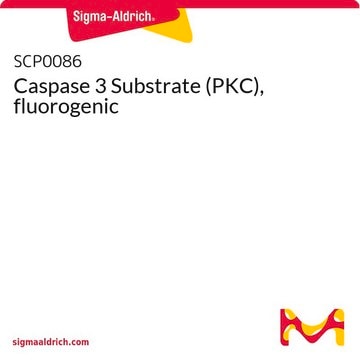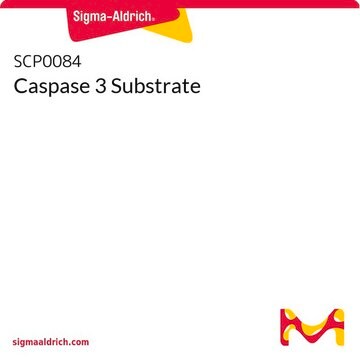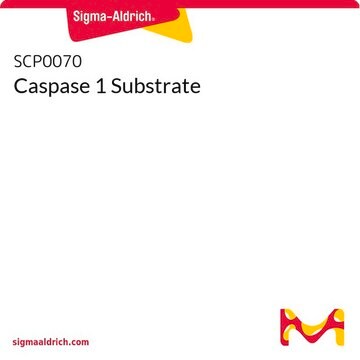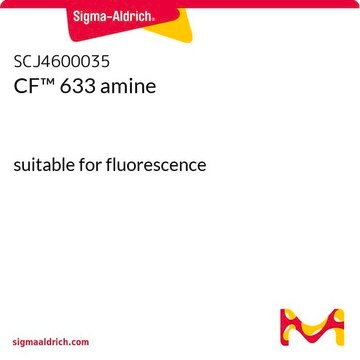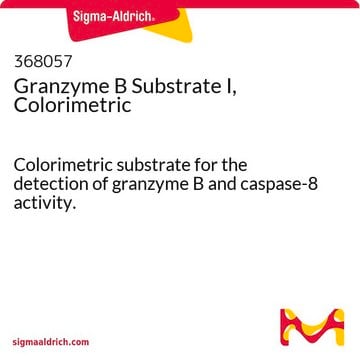All Photos(1)
About This Item
Empirical Formula (Hill Notation):
C33H41N7O11
Molecular Weight:
711.72
UNSPSC Code:
12352200
NACRES:
NA.32
Recommended Products
Assay
≥95% (HPLC)
form
lyophilized
composition
Peptide Content, ≥75%
storage condition
protect from light
storage temp.
−20°C
Amino Acid Sequence
Ac-Leu-Glu-His-Asp-AMC
Application
Ac-LEHD-AMC is used as a fluorogenic substrate of caspase 3 and caspase 9.
Storage Class Code
11 - Combustible Solids
WGK
WGK 3
Flash Point(F)
Not applicable
Flash Point(C)
Not applicable
Certificates of Analysis (COA)
Search for Certificates of Analysis (COA) by entering the products Lot/Batch Number. Lot and Batch Numbers can be found on a product’s label following the words ‘Lot’ or ‘Batch’.
Already Own This Product?
Find documentation for the products that you have recently purchased in the Document Library.
M Nagase et al.
Bioscience, biotechnology, and biochemistry, 65(8), 1741-1747 (2001-10-02)
The molecules participating in apoptosis induced by T-2 toxin in human leukemia HL-60 cells were investigated. The rank order of the potency of trichothecene mycotoxins to induce internucleosomal DNA fragmentation was found to be T-2, satratoxin G, roridin A >
Masahiro Nagase et al.
Immunology letters, 84(1), 23-27 (2002-08-06)
Satratoxins have been recognized as potential immunomodulatory agents in outbreaks of building-related illness. Here we report that satratoxin G-treated human leukemia HL-60 cells underwent apoptosis through the action of caspase-3 which was activated by both caspase-8 and caspase-9. Western blot
Paul M Kasili et al.
Journal of the American Chemical Society, 126(9), 2799-2806 (2004-03-05)
We demonstrate for the first time, the application and utility of a unique optical sensor having a nanoprobe for monitoring the onset of the mitochondrial pathway of apoptosis in a single living cell by detecting enzymatic activities of caspase-9. Minimally
Ikue Suganuma et al.
Insect biochemistry and molecular biology, 41(11), 909-921 (2011-09-14)
We cloned and characterized a novel Bombyx mori homologue (bm-dronc) of Drosophila melanogaster dronc (dm-dronc), which could encode a polypeptide of 438 amino acid residues. Bm-Dronc shares relatively low amino acid sequence identities of 25% and 26% with Dm-Dronc and
Our team of scientists has experience in all areas of research including Life Science, Material Science, Chemical Synthesis, Chromatography, Analytical and many others.
Contact Technical Service
